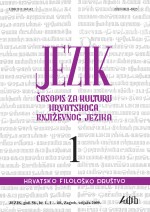Uz povijest hrvatske standardizacije
On the History of Croatian Standardization
Author(s): Nataša BašićSubject(s): Historical Linguistics, Sociolinguistics, South Slavic Languages, Philology
Published by: Hrvatsko filološko društvo
Keywords: History of Croatian Standardization; Croatian language; Linguistics; Philology;
Summary/Abstract: The article discusses the unsustainability of the thesis about the dissolution of a common standard language of the Croats, Serbs, Bosnians/Bosniaks and Montenegrins and the creation of four new ethnic languages, which has been promoted by the American Slavist Robert D. Greenberg in his book Jezik i identitet na Balkanu (Language and Identity in the Balkans). Greenberg has proclaimed the abstract South-Slav dialectal system a language, and holds the four standard languages – Croatian, Serbian, Bosnian/Bosniak, and Montenegrin – that have, through history, developed side by side in four different cultural environments to be merely the doing of nationalist language planners. In the choice of literature and in his interpretation of materials Greenberg hasn’t shown scientific meticulousness, so that he has failed to be objective in his views of the standardization processes in the four new European states: Bosnia, Croatia, Serbia and Montenegro. Special attention is paid to the analysis of the failures in the presentation of the history of Croatian standardization.
Journal: Jezik: časopis za kulturu hrvatskoga književnog jezika
- Issue Year: 56/2009
- Issue No: 1
- Page Range: 12-24
- Page Count: 13
- Language: Croatian

